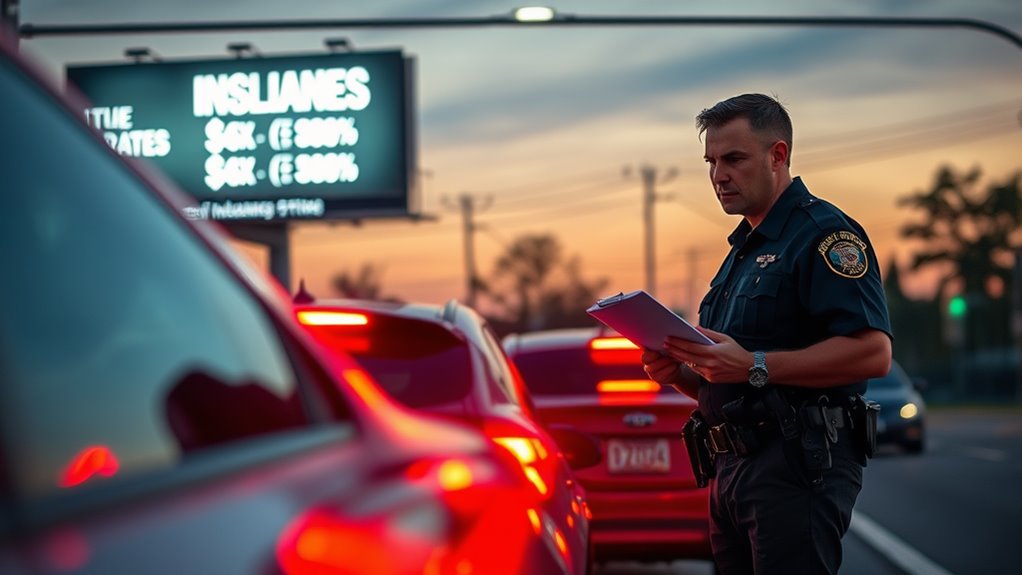Why Face Consequences for Serious Traffic Violations?
When you think about serious traffic violations, consider the ripple effects they create. These aren't just personal missteps; they can lead to significant financial strain and legal troubles that impact your life for years. Furthermore, facing consequences isn't just about punishment—it's about cultivating a sense of responsibility among all drivers. Understanding the broader implications of these violations can change how you view road safety and your role in it. What might that mean for your community?
When you commit a serious traffic violation, the repercussions can extend far beyond a simple ticket. You may face substantial financial consequences that can strain your budget. Fines for serious offenses often exceed hundreds of dollars, and that's just the beginning. Alongside these fines, you'll likely incur court costs, which can add considerably to your financial burden. If your vehicle gets impounded, retrieving it can come with hefty fees as well. If you choose to hire legal counsel to defend against the charges, your expenses will only increase. This combination of costs can lead to a considerable financial strain that affects your overall financial health.
Serious traffic violations can lead to significant financial burdens, including fines, court costs, and potential legal fees.
Beyond the immediate financial implications, serious traffic violations can have severe legal consequences. Depending on the nature of your offense, you might face a temporary or even permanent suspension of your driver's license. This can hinder your mobility and affect your daily life. Additionally, a serious violation can lead to a criminal record, impacting future opportunities, particularly in employment. In some cases, severe offenses such as driving while intoxicated (DWI) or reckless driving could result in jail time. Even if you avoid prison, you might face probation or be mandated to attend programs like traffic school or substance abuse treatment, adding another layer of obligation. License suspension or revocation can prevent driving until reinstatement, which can significantly disrupt daily routines.
The subsequent impact on your employment and insurance can be dire. A criminal record can limit job opportunities, especially in fields requiring driving. If you have a history of serious traffic violations, your insurance premiums will likely skyrocket, increasing costs that can become overwhelming. In extreme cases, insurance companies might even cancel your policy altogether due to perceived high-risk behavior. If you hold specialized licenses, such as a commercial driver's license, these could be revoked, further limiting your employment options. Background checks will reveal any criminal records associated with traffic violations, creating additional barriers in your professional life.
The community and public trust also play a vital role in the consequences of serious traffic violations. Your actions can jeopardize public safety, leading to increased patrols in areas where violations are common. This heightened police presence can create a tense atmosphere, further eroding community trust. Public awareness campaigns and educational programs are often implemented to highlight the dangers associated with serious traffic offenses, aiming to prevent future incidents and promote safer roads.
Lastly, the psychological and social impacts shouldn't be overlooked. The stress and anxiety stemming from dealing with these consequences can take a toll on your mental health. You may face social stigma due to a criminal record or repeated offenses, affecting your interactions with others. Your family may also feel the repercussions, as reduced mobility and changes in routine can disrupt daily life. Ultimately, the long-term guilt of endangering others may linger, serving as a constant reminder of the serious nature of your actions.
Considering these multifaceted consequences, it's clear why facing the repercussions of serious traffic violations is essential for individuals and communities alike.
Conclusion
To sum up, if you think facing consequences for serious traffic violations is a mere slap on the wrist, think again! Imagine your wallet screaming louder than a jet engine, or your job vanishing faster than a magician's rabbit. These repercussions aren't just for show; they're designed to keep our roads safe and our communities thriving. Embracing responsibility isn't just smart—it's downright essential! So, buckle up and drive wisely, or risk turning your life into a chaotic traffic jam!






